Nursing Assignment 2: Challenges in Psychiatric Treatment of Patients
VerifiedAdded on 2022/09/11
|11
|3153
|20
Essay
AI Summary
This nursing assignment delves into the complexities of treating mental disorders, focusing on the controversial use of sedative medications. It examines the rationale behind using sedatives to manage aggressive behaviors and the potential negative impacts, including side effects like sexual dysfunction and ethical concerns related to informed consent. The essay explores the challenges faced by nurses in psychiatric settings, such as physical assaults, psychosocial stressors, and communication barriers, and the fear of being blamed. It also discusses the violation of patient dignity through coercive measures. The assignment provides a comprehensive analysis of the controversies, ethical dilemmas, and practical challenges associated with the use of sedatives and other interventions in mental health care. It highlights the importance of balancing patient safety, ethical considerations, and the well-being of healthcare providers.
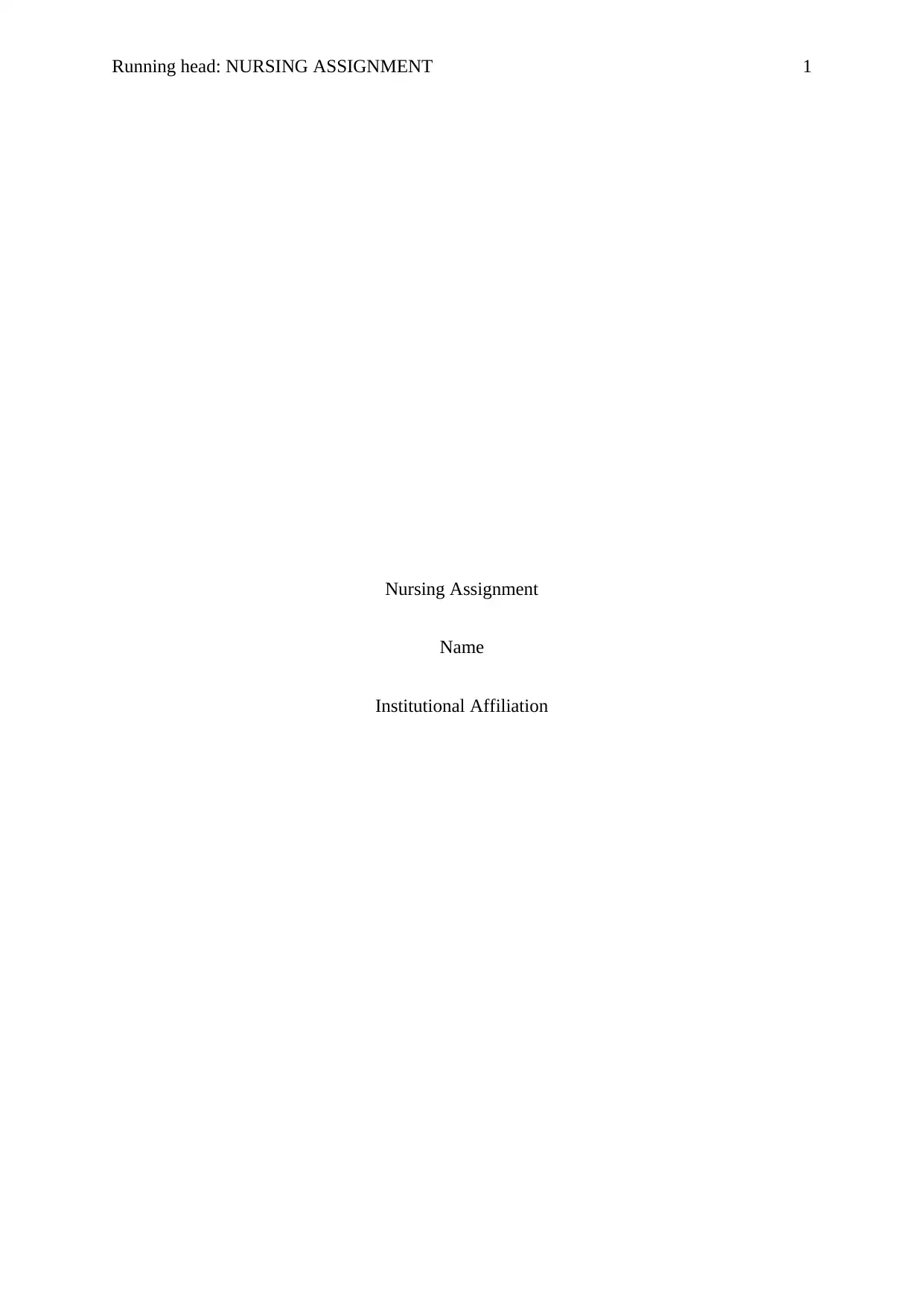
Running head: NURSING ASSIGNMENT 1
Nursing Assignment
Name
Institutional Affiliation
Nursing Assignment
Name
Institutional Affiliation
Paraphrase This Document
Need a fresh take? Get an instant paraphrase of this document with our AI Paraphraser
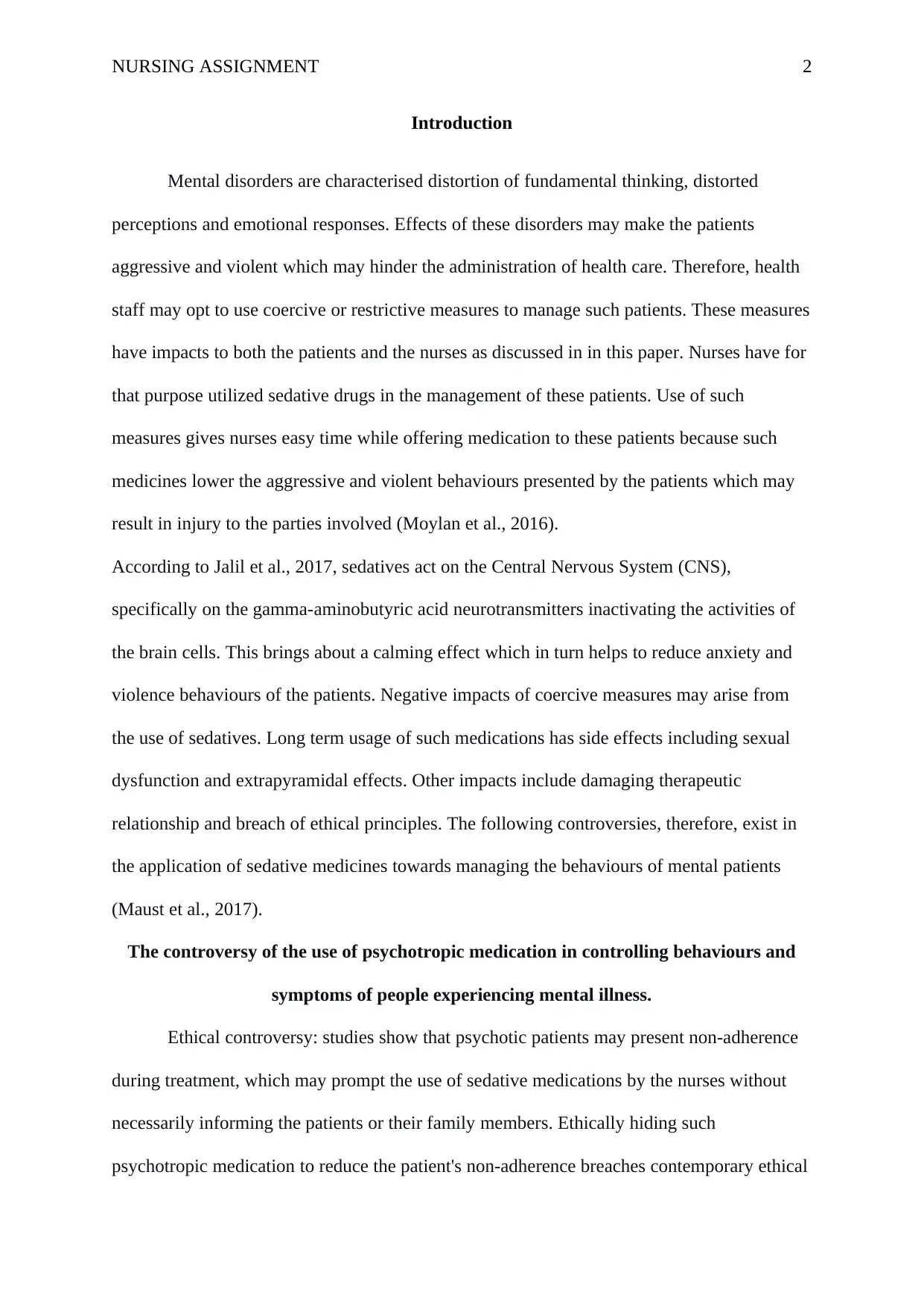
NURSING ASSIGNMENT 2
Introduction
Mental disorders are characterised distortion of fundamental thinking, distorted
perceptions and emotional responses. Effects of these disorders may make the patients
aggressive and violent which may hinder the administration of health care. Therefore, health
staff may opt to use coercive or restrictive measures to manage such patients. These measures
have impacts to both the patients and the nurses as discussed in in this paper. Nurses have for
that purpose utilized sedative drugs in the management of these patients. Use of such
measures gives nurses easy time while offering medication to these patients because such
medicines lower the aggressive and violent behaviours presented by the patients which may
result in injury to the parties involved (Moylan et al., 2016).
According to Jalil et al., 2017, sedatives act on the Central Nervous System (CNS),
specifically on the gamma-aminobutyric acid neurotransmitters inactivating the activities of
the brain cells. This brings about a calming effect which in turn helps to reduce anxiety and
violence behaviours of the patients. Negative impacts of coercive measures may arise from
the use of sedatives. Long term usage of such medications has side effects including sexual
dysfunction and extrapyramidal effects. Other impacts include damaging therapeutic
relationship and breach of ethical principles. The following controversies, therefore, exist in
the application of sedative medicines towards managing the behaviours of mental patients
(Maust et al., 2017).
The controversy of the use of psychotropic medication in controlling behaviours and
symptoms of people experiencing mental illness.
Ethical controversy: studies show that psychotic patients may present non-adherence
during treatment, which may prompt the use of sedative medications by the nurses without
necessarily informing the patients or their family members. Ethically hiding such
psychotropic medication to reduce the patient's non-adherence breaches contemporary ethical
Introduction
Mental disorders are characterised distortion of fundamental thinking, distorted
perceptions and emotional responses. Effects of these disorders may make the patients
aggressive and violent which may hinder the administration of health care. Therefore, health
staff may opt to use coercive or restrictive measures to manage such patients. These measures
have impacts to both the patients and the nurses as discussed in in this paper. Nurses have for
that purpose utilized sedative drugs in the management of these patients. Use of such
measures gives nurses easy time while offering medication to these patients because such
medicines lower the aggressive and violent behaviours presented by the patients which may
result in injury to the parties involved (Moylan et al., 2016).
According to Jalil et al., 2017, sedatives act on the Central Nervous System (CNS),
specifically on the gamma-aminobutyric acid neurotransmitters inactivating the activities of
the brain cells. This brings about a calming effect which in turn helps to reduce anxiety and
violence behaviours of the patients. Negative impacts of coercive measures may arise from
the use of sedatives. Long term usage of such medications has side effects including sexual
dysfunction and extrapyramidal effects. Other impacts include damaging therapeutic
relationship and breach of ethical principles. The following controversies, therefore, exist in
the application of sedative medicines towards managing the behaviours of mental patients
(Maust et al., 2017).
The controversy of the use of psychotropic medication in controlling behaviours and
symptoms of people experiencing mental illness.
Ethical controversy: studies show that psychotic patients may present non-adherence
during treatment, which may prompt the use of sedative medications by the nurses without
necessarily informing the patients or their family members. Ethically hiding such
psychotropic medication to reduce the patient's non-adherence breaches contemporary ethical
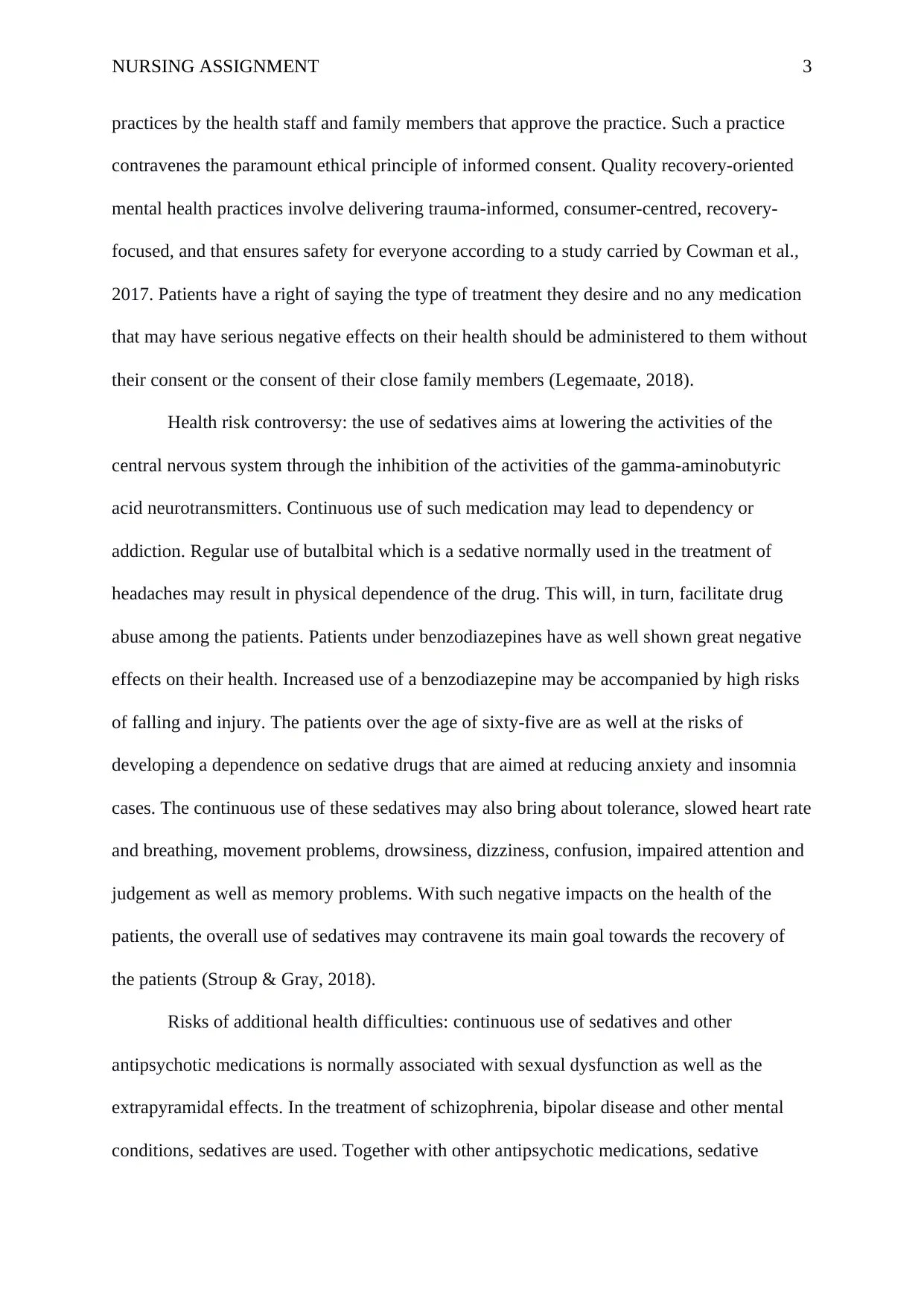
NURSING ASSIGNMENT 3
practices by the health staff and family members that approve the practice. Such a practice
contravenes the paramount ethical principle of informed consent. Quality recovery-oriented
mental health practices involve delivering trauma-informed, consumer-centred, recovery-
focused, and that ensures safety for everyone according to a study carried by Cowman et al.,
2017. Patients have a right of saying the type of treatment they desire and no any medication
that may have serious negative effects on their health should be administered to them without
their consent or the consent of their close family members (Legemaate, 2018).
Health risk controversy: the use of sedatives aims at lowering the activities of the
central nervous system through the inhibition of the activities of the gamma-aminobutyric
acid neurotransmitters. Continuous use of such medication may lead to dependency or
addiction. Regular use of butalbital which is a sedative normally used in the treatment of
headaches may result in physical dependence of the drug. This will, in turn, facilitate drug
abuse among the patients. Patients under benzodiazepines have as well shown great negative
effects on their health. Increased use of a benzodiazepine may be accompanied by high risks
of falling and injury. The patients over the age of sixty-five are as well at the risks of
developing a dependence on sedative drugs that are aimed at reducing anxiety and insomnia
cases. The continuous use of these sedatives may also bring about tolerance, slowed heart rate
and breathing, movement problems, drowsiness, dizziness, confusion, impaired attention and
judgement as well as memory problems. With such negative impacts on the health of the
patients, the overall use of sedatives may contravene its main goal towards the recovery of
the patients (Stroup & Gray, 2018).
Risks of additional health difficulties: continuous use of sedatives and other
antipsychotic medications is normally associated with sexual dysfunction as well as the
extrapyramidal effects. In the treatment of schizophrenia, bipolar disease and other mental
conditions, sedatives are used. Together with other antipsychotic medications, sedative
practices by the health staff and family members that approve the practice. Such a practice
contravenes the paramount ethical principle of informed consent. Quality recovery-oriented
mental health practices involve delivering trauma-informed, consumer-centred, recovery-
focused, and that ensures safety for everyone according to a study carried by Cowman et al.,
2017. Patients have a right of saying the type of treatment they desire and no any medication
that may have serious negative effects on their health should be administered to them without
their consent or the consent of their close family members (Legemaate, 2018).
Health risk controversy: the use of sedatives aims at lowering the activities of the
central nervous system through the inhibition of the activities of the gamma-aminobutyric
acid neurotransmitters. Continuous use of such medication may lead to dependency or
addiction. Regular use of butalbital which is a sedative normally used in the treatment of
headaches may result in physical dependence of the drug. This will, in turn, facilitate drug
abuse among the patients. Patients under benzodiazepines have as well shown great negative
effects on their health. Increased use of a benzodiazepine may be accompanied by high risks
of falling and injury. The patients over the age of sixty-five are as well at the risks of
developing a dependence on sedative drugs that are aimed at reducing anxiety and insomnia
cases. The continuous use of these sedatives may also bring about tolerance, slowed heart rate
and breathing, movement problems, drowsiness, dizziness, confusion, impaired attention and
judgement as well as memory problems. With such negative impacts on the health of the
patients, the overall use of sedatives may contravene its main goal towards the recovery of
the patients (Stroup & Gray, 2018).
Risks of additional health difficulties: continuous use of sedatives and other
antipsychotic medications is normally associated with sexual dysfunction as well as the
extrapyramidal effects. In the treatment of schizophrenia, bipolar disease and other mental
conditions, sedatives are used. Together with other antipsychotic medications, sedative
⊘ This is a preview!⊘
Do you want full access?
Subscribe today to unlock all pages.

Trusted by 1+ million students worldwide
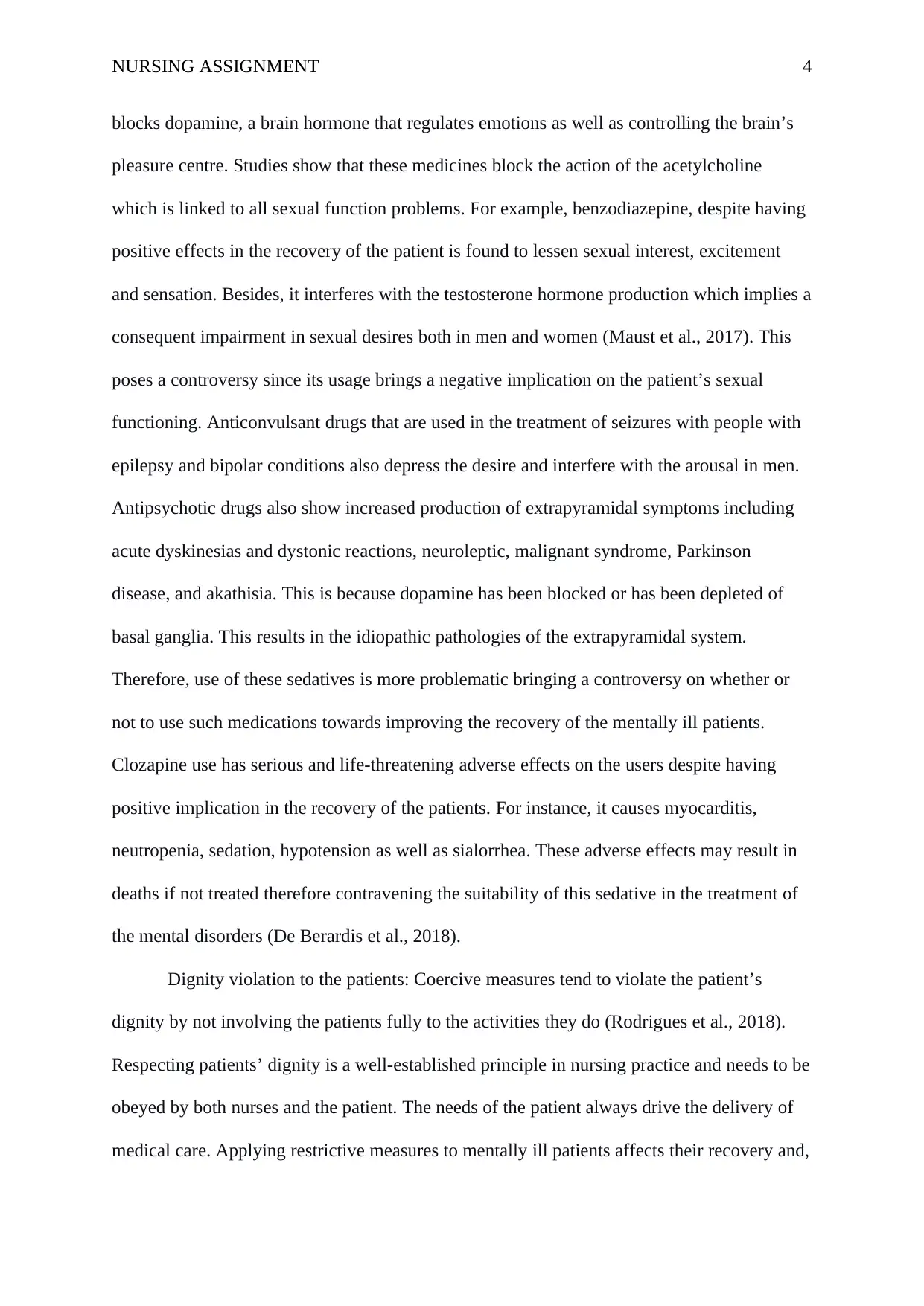
NURSING ASSIGNMENT 4
blocks dopamine, a brain hormone that regulates emotions as well as controlling the brain’s
pleasure centre. Studies show that these medicines block the action of the acetylcholine
which is linked to all sexual function problems. For example, benzodiazepine, despite having
positive effects in the recovery of the patient is found to lessen sexual interest, excitement
and sensation. Besides, it interferes with the testosterone hormone production which implies a
consequent impairment in sexual desires both in men and women (Maust et al., 2017). This
poses a controversy since its usage brings a negative implication on the patient’s sexual
functioning. Anticonvulsant drugs that are used in the treatment of seizures with people with
epilepsy and bipolar conditions also depress the desire and interfere with the arousal in men.
Antipsychotic drugs also show increased production of extrapyramidal symptoms including
acute dyskinesias and dystonic reactions, neuroleptic, malignant syndrome, Parkinson
disease, and akathisia. This is because dopamine has been blocked or has been depleted of
basal ganglia. This results in the idiopathic pathologies of the extrapyramidal system.
Therefore, use of these sedatives is more problematic bringing a controversy on whether or
not to use such medications towards improving the recovery of the mentally ill patients.
Clozapine use has serious and life-threatening adverse effects on the users despite having
positive implication in the recovery of the patients. For instance, it causes myocarditis,
neutropenia, sedation, hypotension as well as sialorrhea. These adverse effects may result in
deaths if not treated therefore contravening the suitability of this sedative in the treatment of
the mental disorders (De Berardis et al., 2018).
Dignity violation to the patients: Coercive measures tend to violate the patient’s
dignity by not involving the patients fully to the activities they do (Rodrigues et al., 2018).
Respecting patients’ dignity is a well-established principle in nursing practice and needs to be
obeyed by both nurses and the patient. The needs of the patient always drive the delivery of
medical care. Applying restrictive measures to mentally ill patients affects their recovery and,
blocks dopamine, a brain hormone that regulates emotions as well as controlling the brain’s
pleasure centre. Studies show that these medicines block the action of the acetylcholine
which is linked to all sexual function problems. For example, benzodiazepine, despite having
positive effects in the recovery of the patient is found to lessen sexual interest, excitement
and sensation. Besides, it interferes with the testosterone hormone production which implies a
consequent impairment in sexual desires both in men and women (Maust et al., 2017). This
poses a controversy since its usage brings a negative implication on the patient’s sexual
functioning. Anticonvulsant drugs that are used in the treatment of seizures with people with
epilepsy and bipolar conditions also depress the desire and interfere with the arousal in men.
Antipsychotic drugs also show increased production of extrapyramidal symptoms including
acute dyskinesias and dystonic reactions, neuroleptic, malignant syndrome, Parkinson
disease, and akathisia. This is because dopamine has been blocked or has been depleted of
basal ganglia. This results in the idiopathic pathologies of the extrapyramidal system.
Therefore, use of these sedatives is more problematic bringing a controversy on whether or
not to use such medications towards improving the recovery of the mentally ill patients.
Clozapine use has serious and life-threatening adverse effects on the users despite having
positive implication in the recovery of the patients. For instance, it causes myocarditis,
neutropenia, sedation, hypotension as well as sialorrhea. These adverse effects may result in
deaths if not treated therefore contravening the suitability of this sedative in the treatment of
the mental disorders (De Berardis et al., 2018).
Dignity violation to the patients: Coercive measures tend to violate the patient’s
dignity by not involving the patients fully to the activities they do (Rodrigues et al., 2018).
Respecting patients’ dignity is a well-established principle in nursing practice and needs to be
obeyed by both nurses and the patient. The needs of the patient always drive the delivery of
medical care. Applying restrictive measures to mentally ill patients affects their recovery and,
Paraphrase This Document
Need a fresh take? Get an instant paraphrase of this document with our AI Paraphraser
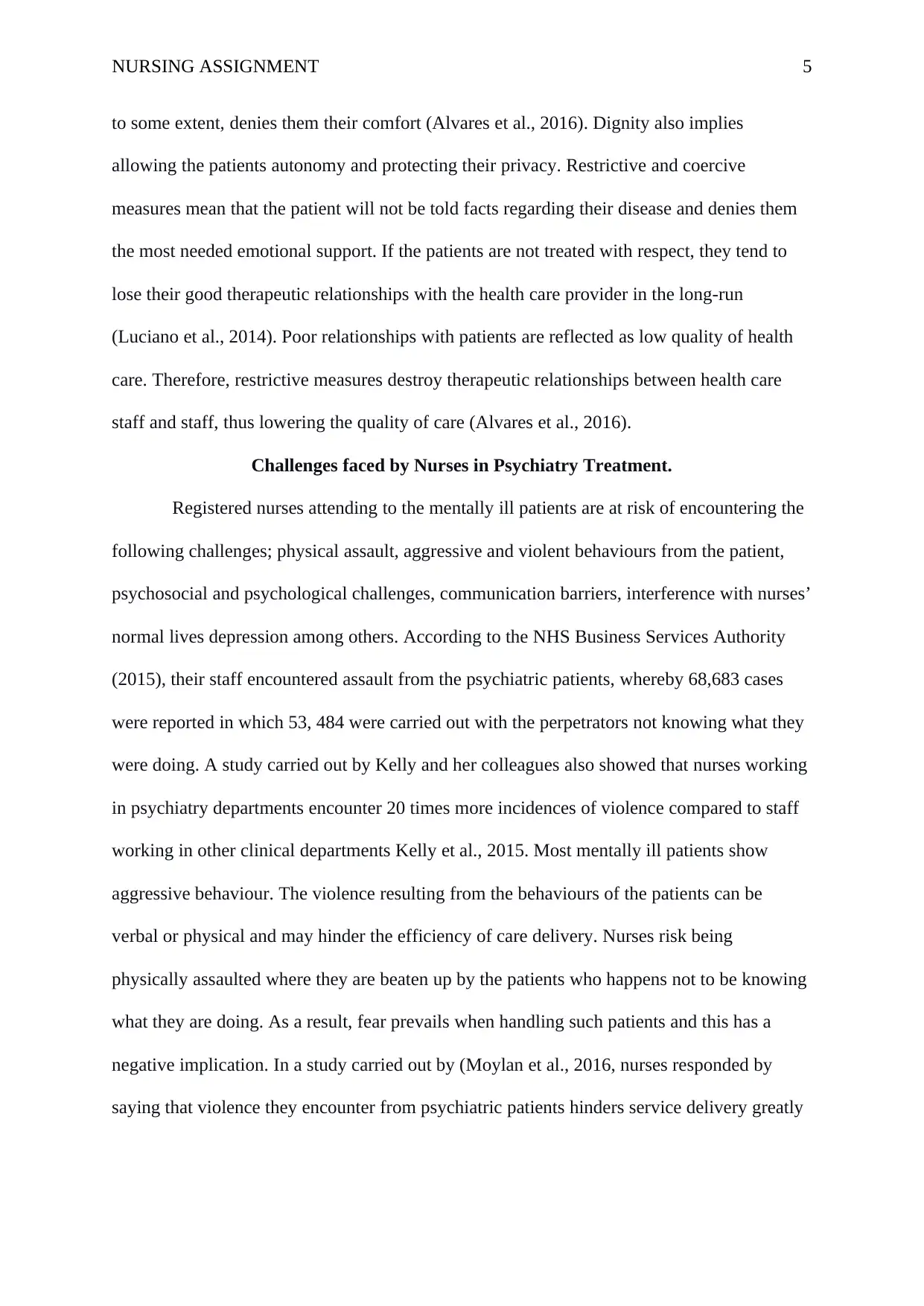
NURSING ASSIGNMENT 5
to some extent, denies them their comfort (Alvares et al., 2016). Dignity also implies
allowing the patients autonomy and protecting their privacy. Restrictive and coercive
measures mean that the patient will not be told facts regarding their disease and denies them
the most needed emotional support. If the patients are not treated with respect, they tend to
lose their good therapeutic relationships with the health care provider in the long-run
(Luciano et al., 2014). Poor relationships with patients are reflected as low quality of health
care. Therefore, restrictive measures destroy therapeutic relationships between health care
staff and staff, thus lowering the quality of care (Alvares et al., 2016).
Challenges faced by Nurses in Psychiatry Treatment.
Registered nurses attending to the mentally ill patients are at risk of encountering the
following challenges; physical assault, aggressive and violent behaviours from the patient,
psychosocial and psychological challenges, communication barriers, interference with nurses’
normal lives depression among others. According to the NHS Business Services Authority
(2015), their staff encountered assault from the psychiatric patients, whereby 68,683 cases
were reported in which 53, 484 were carried out with the perpetrators not knowing what they
were doing. A study carried out by Kelly and her colleagues also showed that nurses working
in psychiatry departments encounter 20 times more incidences of violence compared to staff
working in other clinical departments Kelly et al., 2015. Most mentally ill patients show
aggressive behaviour. The violence resulting from the behaviours of the patients can be
verbal or physical and may hinder the efficiency of care delivery. Nurses risk being
physically assaulted where they are beaten up by the patients who happens not to be knowing
what they are doing. As a result, fear prevails when handling such patients and this has a
negative implication. In a study carried out by (Moylan et al., 2016, nurses responded by
saying that violence they encounter from psychiatric patients hinders service delivery greatly
to some extent, denies them their comfort (Alvares et al., 2016). Dignity also implies
allowing the patients autonomy and protecting their privacy. Restrictive and coercive
measures mean that the patient will not be told facts regarding their disease and denies them
the most needed emotional support. If the patients are not treated with respect, they tend to
lose their good therapeutic relationships with the health care provider in the long-run
(Luciano et al., 2014). Poor relationships with patients are reflected as low quality of health
care. Therefore, restrictive measures destroy therapeutic relationships between health care
staff and staff, thus lowering the quality of care (Alvares et al., 2016).
Challenges faced by Nurses in Psychiatry Treatment.
Registered nurses attending to the mentally ill patients are at risk of encountering the
following challenges; physical assault, aggressive and violent behaviours from the patient,
psychosocial and psychological challenges, communication barriers, interference with nurses’
normal lives depression among others. According to the NHS Business Services Authority
(2015), their staff encountered assault from the psychiatric patients, whereby 68,683 cases
were reported in which 53, 484 were carried out with the perpetrators not knowing what they
were doing. A study carried out by Kelly and her colleagues also showed that nurses working
in psychiatry departments encounter 20 times more incidences of violence compared to staff
working in other clinical departments Kelly et al., 2015. Most mentally ill patients show
aggressive behaviour. The violence resulting from the behaviours of the patients can be
verbal or physical and may hinder the efficiency of care delivery. Nurses risk being
physically assaulted where they are beaten up by the patients who happens not to be knowing
what they are doing. As a result, fear prevails when handling such patients and this has a
negative implication. In a study carried out by (Moylan et al., 2016, nurses responded by
saying that violence they encounter from psychiatric patients hinders service delivery greatly
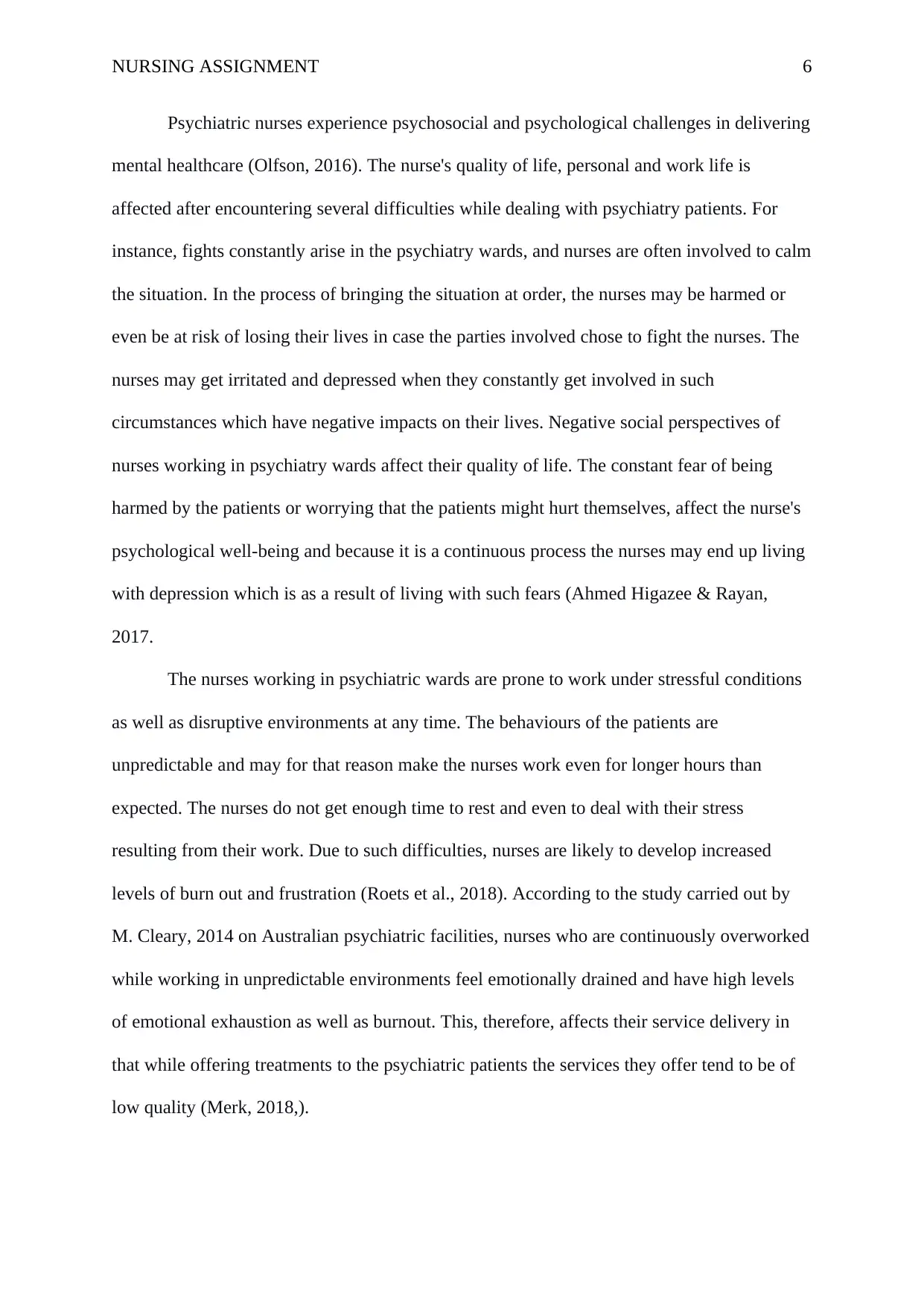
NURSING ASSIGNMENT 6
Psychiatric nurses experience psychosocial and psychological challenges in delivering
mental healthcare (Olfson, 2016). The nurse's quality of life, personal and work life is
affected after encountering several difficulties while dealing with psychiatry patients. For
instance, fights constantly arise in the psychiatry wards, and nurses are often involved to calm
the situation. In the process of bringing the situation at order, the nurses may be harmed or
even be at risk of losing their lives in case the parties involved chose to fight the nurses. The
nurses may get irritated and depressed when they constantly get involved in such
circumstances which have negative impacts on their lives. Negative social perspectives of
nurses working in psychiatry wards affect their quality of life. The constant fear of being
harmed by the patients or worrying that the patients might hurt themselves, affect the nurse's
psychological well-being and because it is a continuous process the nurses may end up living
with depression which is as a result of living with such fears (Ahmed Higazee & Rayan,
2017.
The nurses working in psychiatric wards are prone to work under stressful conditions
as well as disruptive environments at any time. The behaviours of the patients are
unpredictable and may for that reason make the nurses work even for longer hours than
expected. The nurses do not get enough time to rest and even to deal with their stress
resulting from their work. Due to such difficulties, nurses are likely to develop increased
levels of burn out and frustration (Roets et al., 2018). According to the study carried out by
M. Cleary, 2014 on Australian psychiatric facilities, nurses who are continuously overworked
while working in unpredictable environments feel emotionally drained and have high levels
of emotional exhaustion as well as burnout. This, therefore, affects their service delivery in
that while offering treatments to the psychiatric patients the services they offer tend to be of
low quality (Merk, 2018,).
Psychiatric nurses experience psychosocial and psychological challenges in delivering
mental healthcare (Olfson, 2016). The nurse's quality of life, personal and work life is
affected after encountering several difficulties while dealing with psychiatry patients. For
instance, fights constantly arise in the psychiatry wards, and nurses are often involved to calm
the situation. In the process of bringing the situation at order, the nurses may be harmed or
even be at risk of losing their lives in case the parties involved chose to fight the nurses. The
nurses may get irritated and depressed when they constantly get involved in such
circumstances which have negative impacts on their lives. Negative social perspectives of
nurses working in psychiatry wards affect their quality of life. The constant fear of being
harmed by the patients or worrying that the patients might hurt themselves, affect the nurse's
psychological well-being and because it is a continuous process the nurses may end up living
with depression which is as a result of living with such fears (Ahmed Higazee & Rayan,
2017.
The nurses working in psychiatric wards are prone to work under stressful conditions
as well as disruptive environments at any time. The behaviours of the patients are
unpredictable and may for that reason make the nurses work even for longer hours than
expected. The nurses do not get enough time to rest and even to deal with their stress
resulting from their work. Due to such difficulties, nurses are likely to develop increased
levels of burn out and frustration (Roets et al., 2018). According to the study carried out by
M. Cleary, 2014 on Australian psychiatric facilities, nurses who are continuously overworked
while working in unpredictable environments feel emotionally drained and have high levels
of emotional exhaustion as well as burnout. This, therefore, affects their service delivery in
that while offering treatments to the psychiatric patients the services they offer tend to be of
low quality (Merk, 2018,).
⊘ This is a preview!⊘
Do you want full access?
Subscribe today to unlock all pages.

Trusted by 1+ million students worldwide
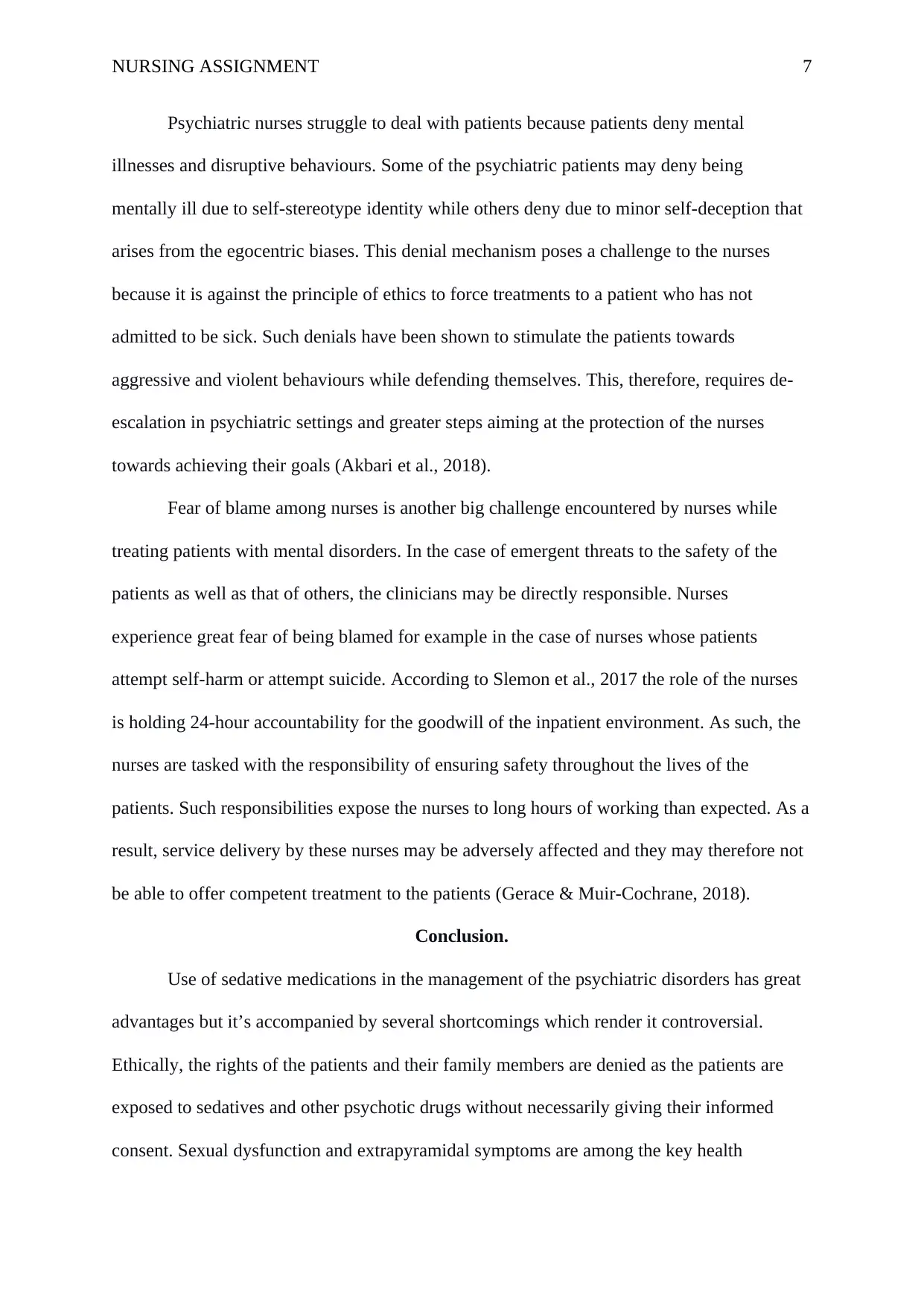
NURSING ASSIGNMENT 7
Psychiatric nurses struggle to deal with patients because patients deny mental
illnesses and disruptive behaviours. Some of the psychiatric patients may deny being
mentally ill due to self-stereotype identity while others deny due to minor self-deception that
arises from the egocentric biases. This denial mechanism poses a challenge to the nurses
because it is against the principle of ethics to force treatments to a patient who has not
admitted to be sick. Such denials have been shown to stimulate the patients towards
aggressive and violent behaviours while defending themselves. This, therefore, requires de-
escalation in psychiatric settings and greater steps aiming at the protection of the nurses
towards achieving their goals (Akbari et al., 2018).
Fear of blame among nurses is another big challenge encountered by nurses while
treating patients with mental disorders. In the case of emergent threats to the safety of the
patients as well as that of others, the clinicians may be directly responsible. Nurses
experience great fear of being blamed for example in the case of nurses whose patients
attempt self-harm or attempt suicide. According to Slemon et al., 2017 the role of the nurses
is holding 24-hour accountability for the goodwill of the inpatient environment. As such, the
nurses are tasked with the responsibility of ensuring safety throughout the lives of the
patients. Such responsibilities expose the nurses to long hours of working than expected. As a
result, service delivery by these nurses may be adversely affected and they may therefore not
be able to offer competent treatment to the patients (Gerace & Muir-Cochrane, 2018).
Conclusion.
Use of sedative medications in the management of the psychiatric disorders has great
advantages but it’s accompanied by several shortcomings which render it controversial.
Ethically, the rights of the patients and their family members are denied as the patients are
exposed to sedatives and other psychotic drugs without necessarily giving their informed
consent. Sexual dysfunction and extrapyramidal symptoms are among the key health
Psychiatric nurses struggle to deal with patients because patients deny mental
illnesses and disruptive behaviours. Some of the psychiatric patients may deny being
mentally ill due to self-stereotype identity while others deny due to minor self-deception that
arises from the egocentric biases. This denial mechanism poses a challenge to the nurses
because it is against the principle of ethics to force treatments to a patient who has not
admitted to be sick. Such denials have been shown to stimulate the patients towards
aggressive and violent behaviours while defending themselves. This, therefore, requires de-
escalation in psychiatric settings and greater steps aiming at the protection of the nurses
towards achieving their goals (Akbari et al., 2018).
Fear of blame among nurses is another big challenge encountered by nurses while
treating patients with mental disorders. In the case of emergent threats to the safety of the
patients as well as that of others, the clinicians may be directly responsible. Nurses
experience great fear of being blamed for example in the case of nurses whose patients
attempt self-harm or attempt suicide. According to Slemon et al., 2017 the role of the nurses
is holding 24-hour accountability for the goodwill of the inpatient environment. As such, the
nurses are tasked with the responsibility of ensuring safety throughout the lives of the
patients. Such responsibilities expose the nurses to long hours of working than expected. As a
result, service delivery by these nurses may be adversely affected and they may therefore not
be able to offer competent treatment to the patients (Gerace & Muir-Cochrane, 2018).
Conclusion.
Use of sedative medications in the management of the psychiatric disorders has great
advantages but it’s accompanied by several shortcomings which render it controversial.
Ethically, the rights of the patients and their family members are denied as the patients are
exposed to sedatives and other psychotic drugs without necessarily giving their informed
consent. Sexual dysfunction and extrapyramidal symptoms are among the key health
Paraphrase This Document
Need a fresh take? Get an instant paraphrase of this document with our AI Paraphraser
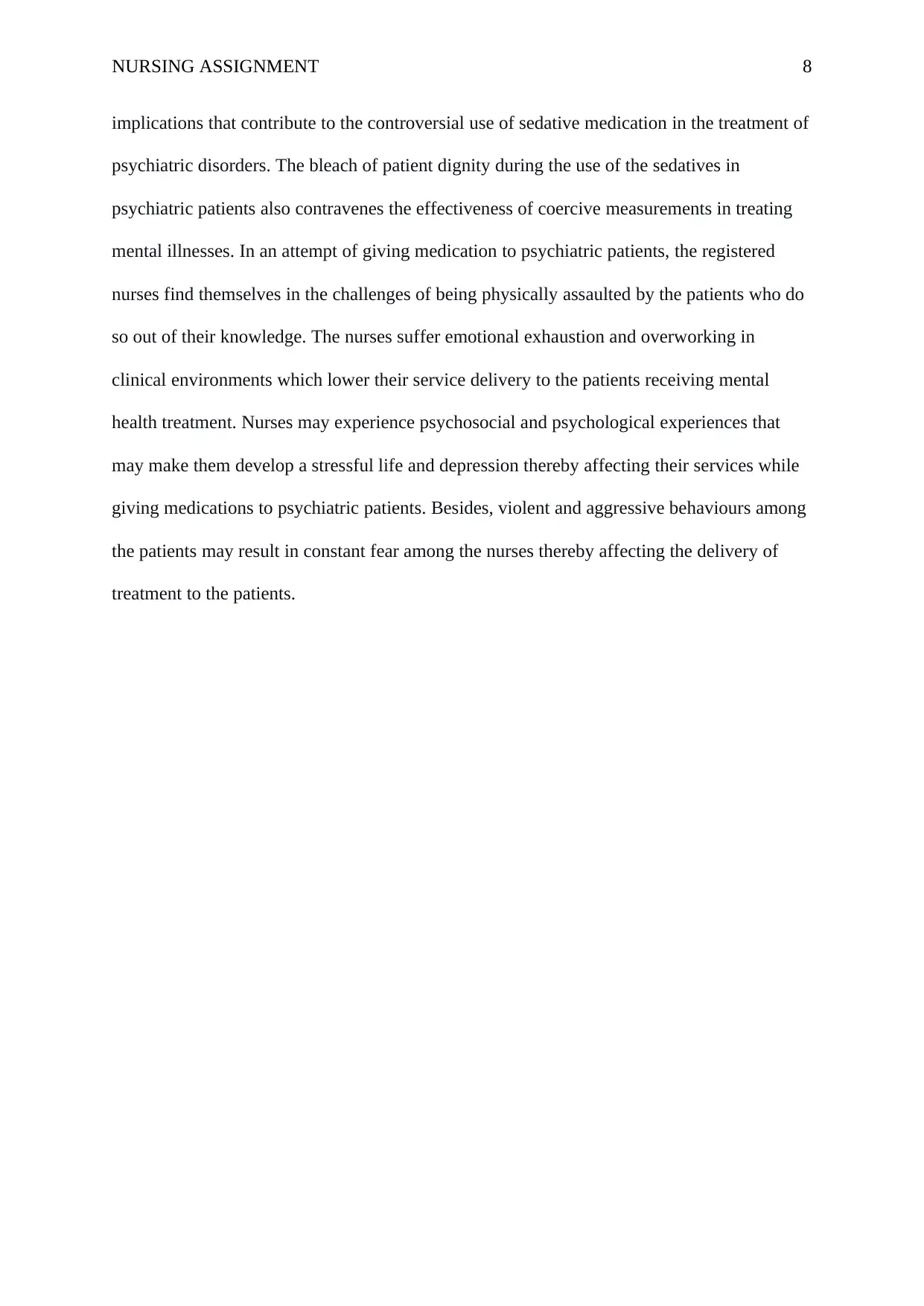
NURSING ASSIGNMENT 8
implications that contribute to the controversial use of sedative medication in the treatment of
psychiatric disorders. The bleach of patient dignity during the use of the sedatives in
psychiatric patients also contravenes the effectiveness of coercive measurements in treating
mental illnesses. In an attempt of giving medication to psychiatric patients, the registered
nurses find themselves in the challenges of being physically assaulted by the patients who do
so out of their knowledge. The nurses suffer emotional exhaustion and overworking in
clinical environments which lower their service delivery to the patients receiving mental
health treatment. Nurses may experience psychosocial and psychological experiences that
may make them develop a stressful life and depression thereby affecting their services while
giving medications to psychiatric patients. Besides, violent and aggressive behaviours among
the patients may result in constant fear among the nurses thereby affecting the delivery of
treatment to the patients.
implications that contribute to the controversial use of sedative medication in the treatment of
psychiatric disorders. The bleach of patient dignity during the use of the sedatives in
psychiatric patients also contravenes the effectiveness of coercive measurements in treating
mental illnesses. In an attempt of giving medication to psychiatric patients, the registered
nurses find themselves in the challenges of being physically assaulted by the patients who do
so out of their knowledge. The nurses suffer emotional exhaustion and overworking in
clinical environments which lower their service delivery to the patients receiving mental
health treatment. Nurses may experience psychosocial and psychological experiences that
may make them develop a stressful life and depression thereby affecting their services while
giving medications to psychiatric patients. Besides, violent and aggressive behaviours among
the patients may result in constant fear among the nurses thereby affecting the delivery of
treatment to the patients.
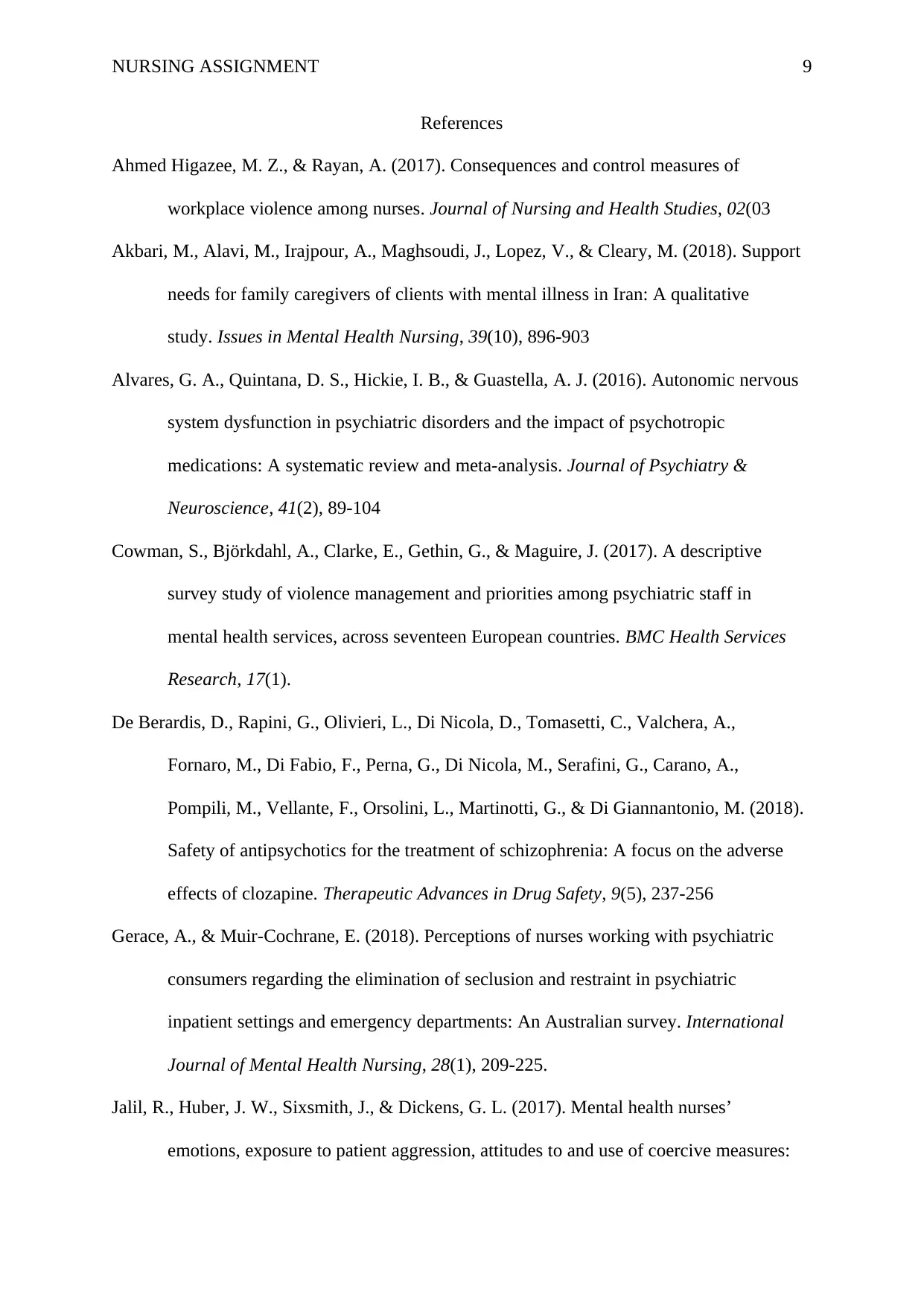
NURSING ASSIGNMENT 9
References
Ahmed Higazee, M. Z., & Rayan, A. (2017). Consequences and control measures of
workplace violence among nurses. Journal of Nursing and Health Studies, 02(03
Akbari, M., Alavi, M., Irajpour, A., Maghsoudi, J., Lopez, V., & Cleary, M. (2018). Support
needs for family caregivers of clients with mental illness in Iran: A qualitative
study. Issues in Mental Health Nursing, 39(10), 896-903
Alvares, G. A., Quintana, D. S., Hickie, I. B., & Guastella, A. J. (2016). Autonomic nervous
system dysfunction in psychiatric disorders and the impact of psychotropic
medications: A systematic review and meta-analysis. Journal of Psychiatry &
Neuroscience, 41(2), 89-104
Cowman, S., Björkdahl, A., Clarke, E., Gethin, G., & Maguire, J. (2017). A descriptive
survey study of violence management and priorities among psychiatric staff in
mental health services, across seventeen European countries. BMC Health Services
Research, 17(1).
De Berardis, D., Rapini, G., Olivieri, L., Di Nicola, D., Tomasetti, C., Valchera, A.,
Fornaro, M., Di Fabio, F., Perna, G., Di Nicola, M., Serafini, G., Carano, A.,
Pompili, M., Vellante, F., Orsolini, L., Martinotti, G., & Di Giannantonio, M. (2018).
Safety of antipsychotics for the treatment of schizophrenia: A focus on the adverse
effects of clozapine. Therapeutic Advances in Drug Safety, 9(5), 237-256
Gerace, A., & Muir-Cochrane, E. (2018). Perceptions of nurses working with psychiatric
consumers regarding the elimination of seclusion and restraint in psychiatric
inpatient settings and emergency departments: An Australian survey. International
Journal of Mental Health Nursing, 28(1), 209-225.
Jalil, R., Huber, J. W., Sixsmith, J., & Dickens, G. L. (2017). Mental health nurses’
emotions, exposure to patient aggression, attitudes to and use of coercive measures:
References
Ahmed Higazee, M. Z., & Rayan, A. (2017). Consequences and control measures of
workplace violence among nurses. Journal of Nursing and Health Studies, 02(03
Akbari, M., Alavi, M., Irajpour, A., Maghsoudi, J., Lopez, V., & Cleary, M. (2018). Support
needs for family caregivers of clients with mental illness in Iran: A qualitative
study. Issues in Mental Health Nursing, 39(10), 896-903
Alvares, G. A., Quintana, D. S., Hickie, I. B., & Guastella, A. J. (2016). Autonomic nervous
system dysfunction in psychiatric disorders and the impact of psychotropic
medications: A systematic review and meta-analysis. Journal of Psychiatry &
Neuroscience, 41(2), 89-104
Cowman, S., Björkdahl, A., Clarke, E., Gethin, G., & Maguire, J. (2017). A descriptive
survey study of violence management and priorities among psychiatric staff in
mental health services, across seventeen European countries. BMC Health Services
Research, 17(1).
De Berardis, D., Rapini, G., Olivieri, L., Di Nicola, D., Tomasetti, C., Valchera, A.,
Fornaro, M., Di Fabio, F., Perna, G., Di Nicola, M., Serafini, G., Carano, A.,
Pompili, M., Vellante, F., Orsolini, L., Martinotti, G., & Di Giannantonio, M. (2018).
Safety of antipsychotics for the treatment of schizophrenia: A focus on the adverse
effects of clozapine. Therapeutic Advances in Drug Safety, 9(5), 237-256
Gerace, A., & Muir-Cochrane, E. (2018). Perceptions of nurses working with psychiatric
consumers regarding the elimination of seclusion and restraint in psychiatric
inpatient settings and emergency departments: An Australian survey. International
Journal of Mental Health Nursing, 28(1), 209-225.
Jalil, R., Huber, J. W., Sixsmith, J., & Dickens, G. L. (2017). Mental health nurses’
emotions, exposure to patient aggression, attitudes to and use of coercive measures:
⊘ This is a preview!⊘
Do you want full access?
Subscribe today to unlock all pages.

Trusted by 1+ million students worldwide
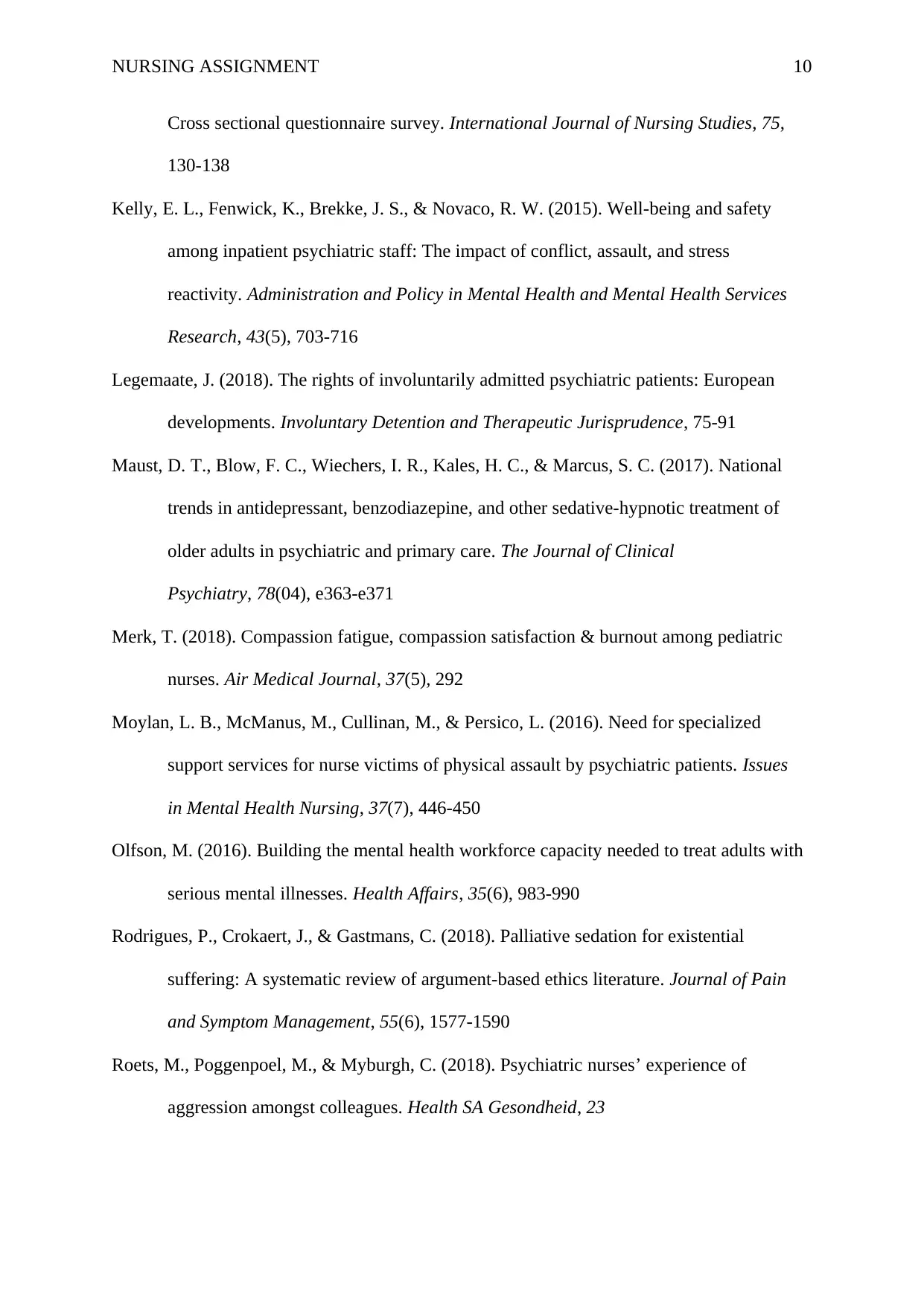
NURSING ASSIGNMENT 10
Cross sectional questionnaire survey. International Journal of Nursing Studies, 75,
130-138
Kelly, E. L., Fenwick, K., Brekke, J. S., & Novaco, R. W. (2015). Well-being and safety
among inpatient psychiatric staff: The impact of conflict, assault, and stress
reactivity. Administration and Policy in Mental Health and Mental Health Services
Research, 43(5), 703-716
Legemaate, J. (2018). The rights of involuntarily admitted psychiatric patients: European
developments. Involuntary Detention and Therapeutic Jurisprudence, 75-91
Maust, D. T., Blow, F. C., Wiechers, I. R., Kales, H. C., & Marcus, S. C. (2017). National
trends in antidepressant, benzodiazepine, and other sedative-hypnotic treatment of
older adults in psychiatric and primary care. The Journal of Clinical
Psychiatry, 78(04), e363-e371
Merk, T. (2018). Compassion fatigue, compassion satisfaction & burnout among pediatric
nurses. Air Medical Journal, 37(5), 292
Moylan, L. B., McManus, M., Cullinan, M., & Persico, L. (2016). Need for specialized
support services for nurse victims of physical assault by psychiatric patients. Issues
in Mental Health Nursing, 37(7), 446-450
Olfson, M. (2016). Building the mental health workforce capacity needed to treat adults with
serious mental illnesses. Health Affairs, 35(6), 983-990
Rodrigues, P., Crokaert, J., & Gastmans, C. (2018). Palliative sedation for existential
suffering: A systematic review of argument-based ethics literature. Journal of Pain
and Symptom Management, 55(6), 1577-1590
Roets, M., Poggenpoel, M., & Myburgh, C. (2018). Psychiatric nurses’ experience of
aggression amongst colleagues. Health SA Gesondheid, 23
Cross sectional questionnaire survey. International Journal of Nursing Studies, 75,
130-138
Kelly, E. L., Fenwick, K., Brekke, J. S., & Novaco, R. W. (2015). Well-being and safety
among inpatient psychiatric staff: The impact of conflict, assault, and stress
reactivity. Administration and Policy in Mental Health and Mental Health Services
Research, 43(5), 703-716
Legemaate, J. (2018). The rights of involuntarily admitted psychiatric patients: European
developments. Involuntary Detention and Therapeutic Jurisprudence, 75-91
Maust, D. T., Blow, F. C., Wiechers, I. R., Kales, H. C., & Marcus, S. C. (2017). National
trends in antidepressant, benzodiazepine, and other sedative-hypnotic treatment of
older adults in psychiatric and primary care. The Journal of Clinical
Psychiatry, 78(04), e363-e371
Merk, T. (2018). Compassion fatigue, compassion satisfaction & burnout among pediatric
nurses. Air Medical Journal, 37(5), 292
Moylan, L. B., McManus, M., Cullinan, M., & Persico, L. (2016). Need for specialized
support services for nurse victims of physical assault by psychiatric patients. Issues
in Mental Health Nursing, 37(7), 446-450
Olfson, M. (2016). Building the mental health workforce capacity needed to treat adults with
serious mental illnesses. Health Affairs, 35(6), 983-990
Rodrigues, P., Crokaert, J., & Gastmans, C. (2018). Palliative sedation for existential
suffering: A systematic review of argument-based ethics literature. Journal of Pain
and Symptom Management, 55(6), 1577-1590
Roets, M., Poggenpoel, M., & Myburgh, C. (2018). Psychiatric nurses’ experience of
aggression amongst colleagues. Health SA Gesondheid, 23
Paraphrase This Document
Need a fresh take? Get an instant paraphrase of this document with our AI Paraphraser
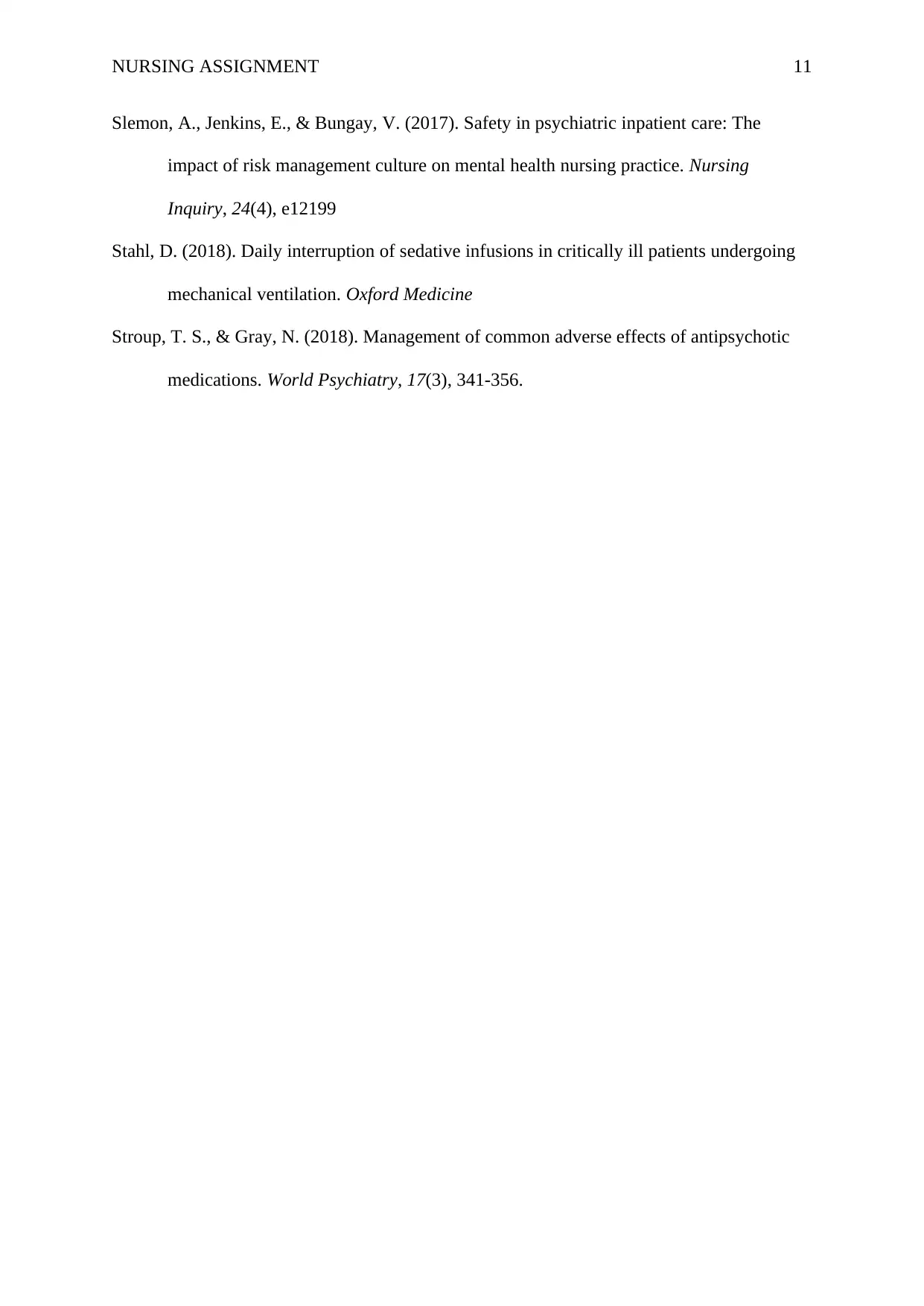
NURSING ASSIGNMENT 11
Slemon, A., Jenkins, E., & Bungay, V. (2017). Safety in psychiatric inpatient care: The
impact of risk management culture on mental health nursing practice. Nursing
Inquiry, 24(4), e12199
Stahl, D. (2018). Daily interruption of sedative infusions in critically ill patients undergoing
mechanical ventilation. Oxford Medicine
Stroup, T. S., & Gray, N. (2018). Management of common adverse effects of antipsychotic
medications. World Psychiatry, 17(3), 341-356.
Slemon, A., Jenkins, E., & Bungay, V. (2017). Safety in psychiatric inpatient care: The
impact of risk management culture on mental health nursing practice. Nursing
Inquiry, 24(4), e12199
Stahl, D. (2018). Daily interruption of sedative infusions in critically ill patients undergoing
mechanical ventilation. Oxford Medicine
Stroup, T. S., & Gray, N. (2018). Management of common adverse effects of antipsychotic
medications. World Psychiatry, 17(3), 341-356.
1 out of 11
Related Documents
Your All-in-One AI-Powered Toolkit for Academic Success.
+13062052269
info@desklib.com
Available 24*7 on WhatsApp / Email
![[object Object]](/_next/static/media/star-bottom.7253800d.svg)
Unlock your academic potential
Copyright © 2020–2026 A2Z Services. All Rights Reserved. Developed and managed by ZUCOL.





